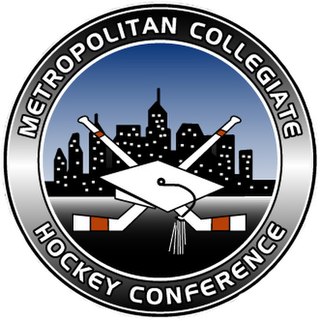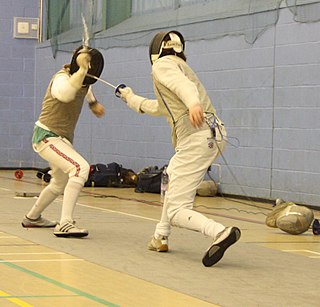
The Northeast Conference (NEC) is a collegiate athletic conference whose schools are members of the National Collegiate Athletic Association (NCAA). Teams in the NEC compete in Division I for all sports; football competes in the Division I Football Championship Subdivision (FCS). Participating schools are located principally in the Northeastern United States, from which the conference derives its name.

The Middle Atlantic Conferences (MAC) is an umbrella organization of three intercollegiate athletic conferences that competes in the NCAA's Division III. The 16 member colleges are in the Mid-Atlantic United States.

Fairleigh Dickinson University is a private university with its main campuses in New Jersey, located in Madison / Florham Park and in Teaneck / Hackensack. Founded in 1942, Fairleigh Dickinson University offers more than 100 degree programs. In addition to two campuses in New Jersey, the university has a campus in Vancouver, British Columbia, one in Wroxton, Oxfordshire, United Kingdom, and an online platform. Fairleigh Dickinson University is New Jersey's largest private institution of higher education, with over 12,000 students.
The Association for Intercollegiate Athletics for Women was founded in 1971 to govern collegiate women's athletics and to administer national championships. During its existence, the AIAW and its predecessor, the Division for Girls' and Women's Sports (DGWS), recognized via these championships the teams and individuals who excelled at the highest level of women's collegiate competition.

NCAA Division III (D-III) is a division of the National Collegiate Athletic Association (NCAA) in the United States. D-III consists of athletic programs at colleges and universities that choose not to offer athletic scholarships to their student-athletes.
The Inter-Collegiate Sailing Association of North America (ICSA) is a volunteer organization that serves as the governing authority for all sailing competition at colleges and universities throughout the United States and in some parts of Canada. It was founded in 1937 as the Inter-Collegiate Yacht Racing Association, and changed to it current name in 2001.
The Intercollegiate Fencing Association (IFA) was the oldest collegiate fencing conference in the United States. It was affiliated with the Eastern College Athletic Conference (ECAC).
The Intercollegiate Rowing Association (IRA) governs intercollegiate rowing between varsity men's heavyweight, men's lightweight, and women's lightweight rowing programs across the United States, while the NCAA fulfills this role for women's open weight rowing. It is the direct successor to the Rowing Association of American Colleges, the first collegiate athletic organization in the United States, which operated from 1870–1894.
Julia Jones-Pugliese was an American national champion foil and épée fencer and fencing coach.

NYU Violets is the nickname of the sports teams and other competitive teams at New York University. The school colors are purple and white. Although officially known as the Violets, the school mascot is a bobcat. The Violets compete as a member of NCAA Division III in the University Athletic Association conference. The university sponsors 23 varsity sports, as well as club teams and intramural sports.

The Metropolitan Collegiate Hockey Conference or MCHC is an ACHA Division 3 league made up of smaller colleges, universities, and community colleges in the Northeast United States. The league was originally formed in 1967-68 as the Metropolitan Intercollegiate Hockey League (MIHL). After a league name change to the BSMIHL for the 1975-76 season, the league changed its name to its current moniker at the start of the 1976-77 season.

Collegiate fencing in the United States can be traced back to as early as 1941. Some of the earliest programs in the US came from the Ivy League schools, with the first Ivy League fencing championships taking place in 1956. As of 2023, there are 112 club teams, 43 women's varsity fencing programs and 33 men's varsity teams in the US. Both clubs and varsity teams participate in the sport, however only the varsity teams may participate in the NCAA championship tournament. Due to the limited number of colleges that have fencing teams, NCAA fencing combines the three divisions into a combined National Collegiate sport, all participating in one NCAA Championship.

The United States Association of Collegiate Fencing Clubs (USACFC) was established in 2003 to educate and promote collegiate fencing throughout the United States. The organization has over 45 teams, about one-third of the schools with non-varsity college club fencing in the U.S.
Evelyn Florence Terhune was an American foil fencer and fencing coach who competed in the women's individual and team foil events at the 1960 Summer Olympics and was the long-time head coach of the women's fencing team at Fairleigh Dickinson University (FDU).

The 2nd Reserve Officers' Training Corps Brigade is an Army Reserve Officers' Training Corps brigade based at Fort Dix, New Jersey.

The Haverford Fords are the athletic teams Haverford College, who compete at the NCAA Division III level in the Centennial Conference. Haverford boasts the only varsity cricket team in the United States. Its men's and women's track and field and cross country teams are perennial powerhouses in their division. The outdoor track and field team won the first 16 Centennial Conference championships, and men's cross country has won all but two Centennial Conference championships. The soccer team is among the nation's oldest, having won its first intercollegiate match in 1905 against Harvard College. The lacrosse team has placed well nationally in the NCAA championships, while Haverford's fencing team has competed since the early 1930s.
Michel Sebastiani is a French fencing master. He earned his Maîtrise d'Escrime degree from Ecole Superieure d’Escrime in Paris. Sebastiani then coached fencing at Cornell University, New York University, Brooklyn College, and Princeton University. He was an Olympic coach for Team USA. He twice won the U.S. Fencing Coaches Association's Schreff Award, given yearly to the most outstanding college fencing coach of the year. Sebastiani was inducted into the U.S. Fencing Hall of Fame in 2015.











